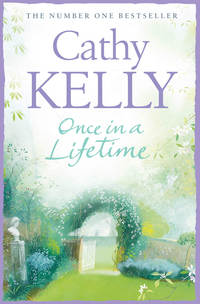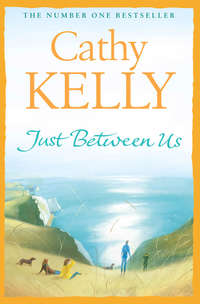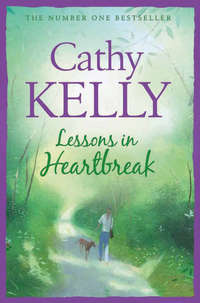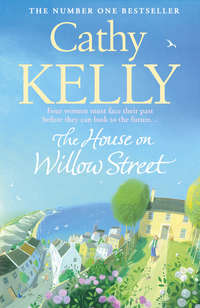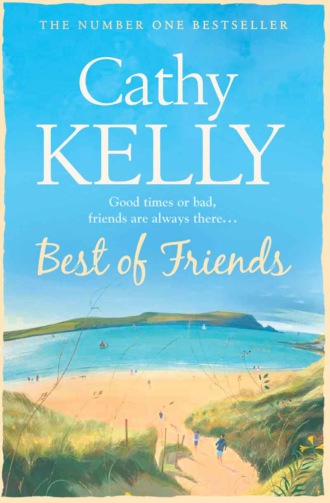
Полная версия
Best of Friends

Best of Friends
Cathy Kelly

Copyright
Published by HarperCollinsPublishers Ltd 1 London Bridge Street London SE1 9GF
www.harpercollins.co.uk
Copyright © Cathy Kelly 2003
Cathy Kelly asserts the moral right to be identified as the author of this work
A catalogue record for this book is available from the British Library
All rights reserved under International and Pan-American Copyright Conventions. By payment of the required fees, you have been granted the non-exclusive, non-transferable right to access and read the text of this e-book on screen. No part of this text may be reproduced, transmitted, downloaded, decompiled, reverse engineered, or stored in or introduced into any information storage and retrieval system, in any form or by any means, whether electronic or mechanical, now known or hereinafter invented, without the express written permission of HarperCollins e-books.
Ebook Edition © February 2012 ISBN: 9780007389315
Version: 2017-11-21
This novel is entirely a work of fiction. The names, characters and incidents portrayed in it are the work of the author’s imagination. Any resemblance to actual persons, living or dead, events or localities is entirely coincidental.
HarperCollinsPublishers has made every reasonable effort to ensure that any picture content and written content in this ebook has been included or removed in accordance with the contractual and technological constraints in operation at the time of publication.
Praise for Cathy Kelly:
‘A must for Kelly’s many fans; a warm, moving read.’
Daily Mail
‘Totally believable.’
Rosamunde Pilcher
‘An upbeat and diverting tale skilfully told…Kelly knows what her readers want and consistently delivers.’
Sunday Independent
‘An absorbing, heart-warming tale.’
Company
‘Her skill at dealing with the complexities of modern life, marriage and families is put to good effect as she teases out the secrets of her characters.’
Choice
‘Kelly dramatises her story with plenty of sparky humour.’
The Times
‘Kelly has an admirable capacity to make the readers identify, in turn, with each of her female characters…’
Irish Independent
For Tamsin
Table of Contents
Title Page
Copyright
Praise for Cathy Kelly:
Dedication
PROLOGUE
CHAPTER ONE
CHAPTER TWO
CHAPTER THREE
CHAPTER FOUR
CHAPTER FIVE
CHAPTER SIX
CHAPTER SEVEN
CHAPTER EIGHT
CHAPTER NINE
CHAPTER TEN
CHAPTER ELEVEN
CHAPTER TWELVE
CHAPTER THIRTEEN
CHAPTER FOURTEEN
CHAPTER FIFTEEN
CHAPTER SIXTEEN
CHAPTER SEVENTEEN
CHAPTER EIGHTEEN
CHAPTER NINETEEN
CHAPTER TWENTY
CHAPTER TWENTY-ONE
CHAPTER TWENTY-TWO
CHAPTER TWENTY-THREE
CHAPTER TWENTY-FOUR
CHAPTER TWENTY-FIVE
CHAPTER TWENTY-SIX
CHAPTER TWENTY-SEVEN
CHAPTER TWENTY-EIGHT
CHAPTER TWENTY-NINE
CHAPTER THIRTY
CHAPTER THIRTY-ONE
CHAPTER THIRTY-TWO
CHAPTER THIRTY-THREE
CHAPTER THIRTY-FOUR
CHAPTER THIRTY-FIVE
AFTERWORD
Excerpt from The House on Willow Street
Prologue
Chapter One
Back Ads
About the Author
By the same author
About the Publisher
PROLOGUE
Brush hair, brush teeth, forget about eyeliner, just go for mascara and a dust of bronzer. Squirt of deodorant…blast, none left. Put that on the shopping list. Where is the shopping list, anyway…?
Sally Richardson had a million and one things on her mind as she hastily buttoned up her shirt and pulled on a pair of black trousers over skin still damp from the shower.
Friday mornings in the Richardsons’ house were even more manic than usual because on Fridays and Saturdays, The Beauty Spot, the beauty salon that Sally owned and ran, opened at nine instead of half-past. That extra half-hour made a huge difference, Sally thought, every time Friday rolled round. She had to be out of the front door at eight forty-five on the nail to drop the boys at the day nursery instead of the rest of the week’s more leisurely nine fifteen.
There was no time to dawdle over toast and coffee – not that much dawdling ever went on at the Richardsons’, with two working parents.
Sally told her friends that she never had fantasies in which Jude Law ripped off all her clothes and told her she was the most beautiful woman he’d ever seen in his life. No, her fantasies were about the household running to a strict timetable, where she was perkily out of bed and showered by half-past seven (with make-up on, hair perfect and no snags in her tights), ready to drag three-year-old Daniel from his bed (four-year-old Jack would already be up and beheading a few Action Men). Dressing the boys and getting breakfast ready would happen without too much cereal ending up on the floor and without small boys squabbling, and there might even be time for Sally to share a cup of coffee with Steve before he raced out of the door at eight twenty. Of course, this was the stuff of daydreams, as Sally often admitted to her mother-in-law, Delia. (She nearly told Delia about the Jude Law thing but then thought better of it. Delia was more of a Sean Connery woman, anyway.)
‘It can’t be good for the image of a beauty salon when the owner arrives out of breath, without a screed of make-up on her face and her shirt buttoned up all wrong,’ Sally had once pointed out.
But Delia, who knew how hard her daughter-in-law worked and thought she looked just as good with her creamy skin and flashing dark eyes free of cosmetics, laughed and said that early morning rushing was the working mother’s daily marathon. ‘I was as slim as you when Steve and Amy were young, and now look at me,’ she said ruefully. ‘Upholstered hips and arms like a weightlifter.’
‘You look great,’ chided Sally, who adored her mother-in-law and treated her like a surrogate mum. Her own had died of cancer when Sally had been only twenty.
Kids definitely kept you thin, Sally decided on this particular Friday morning in February. She’d been up for an hour and still hadn’t managed more than a sip of tea because Danny had upended his Rice Pops all over his jeans and sweater, necessitating a complete change. The toaster had decided to have one of its off days and burned Steve’s toast to charcoal, setting off the smoke detector.
‘Damn!’ came his muttered voice from the hall where he was attempting to silence the alarm.
‘Damn, damn, damn,’ repeated Danny happily, at the kitchen table, where he was having a good go at spilling more cereal.
‘Damn, damn, damn,’ joined in Jack, banging his spoon against his fortunately empty dish.
Sally, foreseeing days of ‘damns’ morning, noon and night, sighed. ‘Language,’ she mouthed at Steve when he appeared a moment later, fiddling with his cuff.
‘Sorry,’ he said. ‘Forgot. The button popped off while I was reaching up. Where’s the thread?’
Sally prised the last bit of charcoal from the toaster. ‘To be honest, Steve, you have a better chance of finding another clean shirt than of finding a needle and thread anywhere in this house. Will I iron you another one?’
‘No, love, thanks. You don’t have time. I’ll do it.’ Steve leaned over his tiny wife and planted a kiss on the top of her head.
Steve was six foot two while Sally was a petite five three. ‘I never realised how ridiculous we looked together until I saw our wedding photos,’ she would joke. Height aside, they made a handsome couple, Sally’s elfin, dark-haired, dark-eyed looks a dramatic contrast to her husband’s clean-cut features, fair hair and unusual rich brown eyes. The boys took after their mother, their inky black eyes, like hers, gleaming with mischief.
Steve was not a natural with the iron and he grumbled as he wrestled with another shirt. ‘Today of all days, with the boss leaving, and I’m late as it is…’
‘If the worst thing that happens today is your shirt button and this pair screaming “damn” when your mother comes to mind them this afternoon, then we’re doing fine,’ Sally pointed out.
Steve nodded, teasingly. ‘You’re right, Pollyanna.’
‘I’m not Pollyanna,’ protested his wife. ‘It’s just that Mum always used to say count your…’
‘…blessings. I know.’ Steve pulled on his ironed shirt and then drained his coffee.
‘I don’t want to be a pain in the you-know-what,’ Sally went on earnestly, ‘like some Goody Two-Shoes always looking on the bright side.’
‘You’re not,’ Steve said, shoving the ironing board away with a clatter. ‘But your optimism is one of the things I love about you. C’mere.’
They exchanged a proper kiss this time.
‘Mummy, what’s a pain in the you-know-what?’ asked Jack innocently.
His parents laughed, then Steve picked up his jacket from the back of a kitchen chair. ‘Bye, brats,’ he said, kissing his beloved sons.
‘Bye, Daddy,’ they chorused.
‘Bye, Pollyanna.’ He ducked as though Sally might throw something at him.
‘You’re the brat!’ she yelled good-humouredly.
The front door slammed and Sally glanced at the clock. Eight thirty-two. Blast. Late again and Danny was only a quarter of the way through his cereal. She sat down beside her younger son and urged him to hurry up, which inevitably made him slow down. Danny had a stubborn streak.
Ruffling his unruly hair lovingly, she thought of how lucky she was, having Steve and the boys. Steve might tease her about it, but her mantra had always been that you shouldn’t take anything for granted in this life.
As her mum used to say: you never knew what was around the corner.
CHAPTER ONE
Abby stared into the cold hard depths of the hairdresser’s mirror. As if she hadn’t enough problems, now she was sure she could see fresh lines fanning out around her eyes. Ageing was like the San Andreas fault, she thought grimly: you never knew where the next crack was going to appear. Hitting forty had been the start of the slide, definitely. Since then – unbelievably two years ago – she felt her entire face had gone to pot.
Beside her, Cherise, who secretly thought Abby looked even more attractive in reality than she did on television, gazed critically at Abby’s newly cut hair.
Cherise, like every member of staff in Gianni’s Salon, was glowingly young, with dewy skin. She wore the hairstylist’s uniform of black hipsters, slinky little T-shirt and belly ring. Abby whipped her envious eyes from Cherise’s flat, toned stomach and smiled into the mirror. The wrinkles obligingly smiled with her. Despite her lovely new haircut, her smart Armani shirt, and the admiration of most of the salon, who had obviously recognised Abby, and watched her with interest, even though they pretended their eyes were glued to their copies of Hello!, Abby felt a chasm in the pit of her stomach. God, she was getting old. Old and tired-looking. Forty-two. It even sounded old. Other people said she was imagining it.
‘Do you like it?’ Cherise was anxious for some feedback.
‘Thanks, Cherise, it’s lovely,’ Abby said kindly, instantly apologetic for not having said something nice sooner.
Abby was kind to everyone. That, said her producer on Declutter: Your Home and Your Life, was a huge part of her charm and, undoubtedly, the key to her success. It wasn’t fake kindness: it was the real thing. Abby liked people and they liked her back. The ratings on Declutter had proved that. In just two seasons, Abby Barton had been transformed from a mum with a part-time small business into a TV hotshot.
Her fledgeling home decluttering service couldn’t keep up with demand, there were talks about Abby writing a book to go with the programme, and the filming of a third series was due to start shortly. Both the TV pundits and the viewers loved her, the bank now sent the family Christmas cards instead of irate letters, and, occasionally, people she only vaguely knew waved at her hysterically when their cars passed in traffic.
She still felt the same underneath, though. As Abby said to her close girlfriends, she was waiting for people to realise that she was an impostor and that she didn’t deserve her new-found fame or the money.
‘Fame is transient – lack of self-confidence lasts for ever,’ she joked, making everyone crack up with laughter.
‘No one could ever say it’s gone to your head,’ her husband, Tom, said occasionally, huge praise from him.
Tom had unruly dark hair streaked with grey, a narrow, clever-looking face, rimless glasses and an elongated frame from never giving in to either the biscuit tin or too many glasses of wine (unlike Abby). There was a distinct puritan streak in him, an austerity that made him perfect deputy headmaster material, but also deeply disapproving of people who lost sight of ascetic values.
He’d have hated Abby to have changed from her old slightly scatty self into a full-blown celebrity obsessed with clothes, cars and holidays.
However, intellectually brilliant but unworldly, he’d never actually realised that Abby, despite being quite happy to find treasures in second-hand boutiques during their hard-up days, had always secretly liked to spend money on her hair and on ludicrously expensive cosmetics. And that one of the advantages of her new-found financial success was that Abby no longer had to hide the cost of hairdos and new clothes by buying cheaper cuts of meat and special offer vegetables. Certainly if Tom were given the slightest clue to how much today’s jaunt to Gianni’s had cost, he’d be scathing about the waste of money.
Money was a bit of a sore subject in the Barton household these days. After years of earning so little, Abby had imagined that her new, comparative wealth would make their lives much easier. Instead, in some ways it had made them more difficult, mainly because of Tom’s vision of himself as head of the household and breadwinner.
At school, he might be viewed as a modern educator with plenty of innovative ideas, but at home Tom liked the traditional roles to be maintained. Despite her increased workload, Abby still did all the shopping and laundry, an arrangement that was beginning to grate. And she knew that he, like many men, did not feel comfortable about his wife earning more than he did.
‘I think it suits you a bit more feathery round the jaw,’ Cherise said now, fiddling with the fine ends and fluffing them up. ‘It’s kinder to the jawline.’ Then she smiled and stood back to admire her famous client from a distance. ‘Do you know, it takes years off you!’
Abby had a sudden vision of herself saying the same thing to her Aunt Sadie when Sadie had finally given up her five-decade red-lipstick habit in favour of a subtle warm pink. White-haired Sadie, squinting in the mirror in disapproval at the sight of her mouth without its narrow slash of crimson, had actually looked much the same. Still seventy-six, just with a more suitable lip colour. The youthful Cherise probably thought of Abby in the same way that Abby thought of Aunt Sadie: a tough old broad vainly trying to keep age at bay. But all the money and fame in the world couldn’t do that.
Outside Gianni’s with a bag of hair-care products, Abby slammed the rear door of her glossy black four-wheel drive – the purchase of which had almost started a war in the Barton household – opened the driver’s door and swung herself into the seat. Her hair had turned out well, she thought, glancing critically in the rear-view mirror. Those much-discussed strands of rich chestnut really brought out the sea-green tints in her eyes.
A passer-by stared into the car and Abby saw the familiar quickening of recognition in the man’s eyes. She shot him a brief professional smile and gunned the engine, hoping she’d have manoeuvred out of the parking space before he realised that he hadn’t smiled at an acquaintance – which was what most people initially thought – but at Abby Barton, television celebrity and self-help guru.
Being recognised still shocked Abby. After eighteen months of it, she still wasn’t used to complete strangers nodding to her in the supermarket, then their expressions changing as the truth hit them. That wasn’t someone from down the road or the woman they saw daily at the school gates. It was that celebrity, whatshername, the one with that TV show telling everyone how to sort out their lives.
When Abby’s daughter, Jess, was with her, the teenager would give a running commentary on the person’s thoughts.
‘What’s she doing in the supermarket? Don’t famous people have someone to do their shopping?’ Jess would mutter, leaving her mother in fits of laughter as they hurtled their trolley away down an aisle. ‘And look at the state of those tracksuit bottoms. I thought them big telly stars were loaded and she’s out in trackies with a hole in them. Scandalous.’ With a witty tongue and a great eye for a comic moment, Jess somehow managed to make being stared at by strangers fun. At other times, without the fifteen-year-old riding shotgun, it wasn’t always quite so funny – especially, as Abby had discovered to her astonishment, since people felt that it was OK to say anything to famous people, even remotely famous people like herself.
Hovering by the tampons one day, wearily deciding which type she’d buy from the dizzying range, she’d jumped when a woman said: ‘Wow! I thought you were much younger from the TV. They must use amazing make-up.’
For once, it had taken a lot of effort to summon up the legendary Barton kindness. ‘They do. Truckloads of it,’ Abby had said between gritted teeth, and picked up the first box of tampons that came to hand – the wrong ones, it turned out. Fame wasn’t all it was cracked up to be, that was for sure.
As she drove out of the city, her mood lifted. It was impossible to remain miserable on such a lovely March day, when the promise of summer was in the air. Banks of daffodils brightened the edges of the motorway, all craning their long necks together as if to catch sight of a passing car. Between great grey clouds above the gently rolling hills that protectively surrounded Cork city, snatches of cerulean sky could be seen.
Leaving the sedate sprawl of the suburbs behind, Abby exited the motorway and took the road to Dunmore. Exclusive Dunmore was once a tiny harbour town nestling on the outskirts of Cork, but now the city was reaching out towards it. Abby could imagine giant tracts of housing estate would one day smother the lovely green meadows that encircled the town, remorselessly merging it with the city.
But for now it was still a perfectly self-contained place with its own banks, shops, industries, a recently restored pier and a strong sense of community among the five thousand residents.
It was six months since the Barton family had moved here, and Abby loved it. She adored the horseshoe harbour and the historic town square with its old courthouse (now a bank); the railway hotel, and the exquisite small, spired church set amid the big houses of the wealthy townspeople. A hundred years ago, Dunmore had been something of a holiday town for wealthy Victorians, who came to take the sulphuric waters. They built the big villas on Knock Hill from where they could look out over their rhododendron-filled gardens down to the jagged coastline. Now, these buildings were transformed into small hotels, conference centres and offices, with only a few still functioning as private residences. The spa water was sold round the world and the bottling factory provided massive employment in the area. The wealthy of Dunmore were no longer the idle rich but people who had to work hard to continue to live in this much sought-after area. Abby never drove through the pretty, well-maintained town centre without feeling a surge of gratitude that she had come so far.
Little Annie Costello of The Cottages, a misleading name for a pinched line of council houses in a country town many miles from Cork, had never hoped to have made it so far in life. The families who lived in The Cottages were lucky if they knew where their next meal was coming from. Now Abby Barton, née Annie Costello, could order in caterers should she feel like it. A healthy bank account, fame and respectability were hers, and the house in Dunmore was the icing on the cake.
Her parents hadn’t lived to see her success. Mum would have been so pleased, Abby often thought sadly, imagining her mother’s face filled with pride at how far her Annie had come. Her father, on the other hand, wouldn’t have cared how successful his daughter had become, as long as he still had enough money in his pocket for his daily ration of booze.
Abby’s next port of call was the supermarket. When they were first married, she and Tom used to do the weekend shop together, but these days, when she was busier than ever, he never offered to help.
She literally ran round the aisles, hoping to be ready in time to pick Jess up from the train station. It was only a ten-minute walk from the station to their home in Briar Lane, but Jess had looked tired from hauling her bag of books every day. Abby had had to bite her lip not to say anything. The last time Abby had offered to collect her, Jess had told her indignantly she was fed up with being treated like a child.
‘I like having a bit of peace,’ she’d snapped, raking her fingers through her sandy ponytail. ‘I have to get the train to school on my own, so I can manage to walk home from the station.’
That had hurt. Jess was the one member of the family who hadn’t wanted to move from the Bartons’ modest four-bedroom city semi where they’d lived all her life. It had been close to Jess’s friends and to her school, while the house in Dunmore was miles away, and Jess felt very cut off.
Today was Friday and Jess was sure to be very tired. She couldn’t resent a lift today, surely, Abby thought. They could talk on the way home, perhaps, and it might be like old times. Before work had taken up so much of her time, and before they’d moved to Dunmore, Abby had often picked up Jess and her best friend, Steph, from school. The girls used to whoop with delight to see Abby’s mud-caked old Fiat parked by the school gates, and after dumping sports bags, filthy runners and dog-eared library books into the boot, they would chatter merrily all the way home, telling Abby about how horrible Saffron Walsh in their year thought she was the bee’s knees now she had a pink Guess watch, how the O’Brien twins were going to be expelled for smoking and how Miss Aston must have a crush on the new history teacher, Mr Lanoix, because her eyes turned dreamy every time she bumped into him in the corridor.
However, Abby’s shopping done, the length of the queue at the check-out conspired against her, and then a woman with a huge trolley-load and no purse held up everyone for ten minutes. Once she had finally thrown her shopping into the car, Abby drove rapidly to the tiny station, looking out for a lanky, sandy-haired figure in a grey skirt and cardigan hauling a giant school bag. But, apart from a couple pulling a huge suitcase up the station steps, there was no one there.




